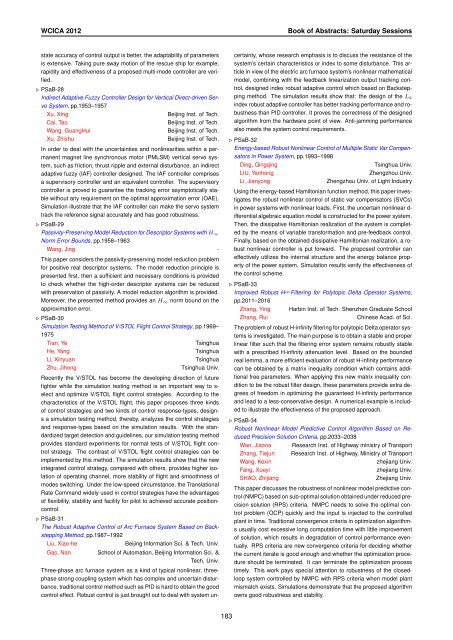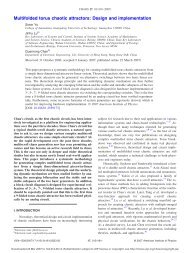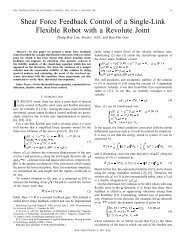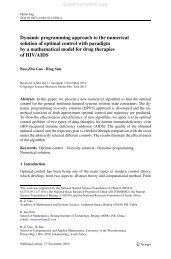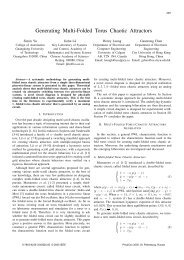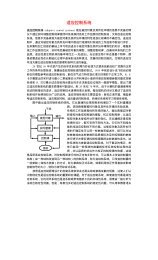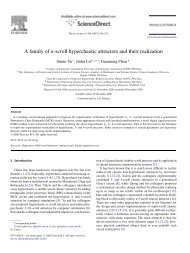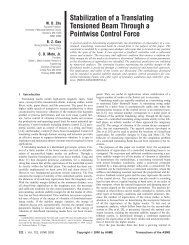Conference Program of WCICA 2012
Conference Program of WCICA 2012
Conference Program of WCICA 2012
You also want an ePaper? Increase the reach of your titles
YUMPU automatically turns print PDFs into web optimized ePapers that Google loves.
<strong>WCICA</strong> <strong>2012</strong><br />
Book <strong>of</strong> Abstracts: Saturday Sessions<br />
state accuracy <strong>of</strong> control output is better, the adaptability <strong>of</strong> parameters<br />
is extensive. Taking pure sway motion <strong>of</strong> the rescue ship for example,<br />
rapidity and effectiveness <strong>of</strong> a proposed multi-mode controller are verified.<br />
◁ PSaB-28<br />
Indirect Adaptive Fuzzy Controller Design for Vertical Direct-driven Servo<br />
System, pp.1953–1957<br />
Xu, Xing<br />
Cai, Tao<br />
Wang, GuangHui<br />
Xu, Zhishu<br />
Beijing Inst. <strong>of</strong> Tech.<br />
Beijing Inst. <strong>of</strong> Tech.<br />
Beijing Inst. <strong>of</strong> Tech.<br />
Beijing Inst. <strong>of</strong> Tech.<br />
In order to deal with the uncertainties and nonlinearities within a permanent<br />
magnet line synchronous motor (PMLSM) vertical servo system,<br />
such as friction, thrust ripple and external disturbance, an indirect<br />
adaptive fuzzy (IAF) controller designed. The IAF controller comprises<br />
a supervisory controller and an equivalent controller. The supervisory<br />
controller is proved to guarantee the tracking error asymptotically stable<br />
without any requirement on the optimal approximation error (OAE).<br />
Simulation illustrate that the IAF controller can make the servo system<br />
track the reference signal accurately and has good robustness.<br />
◁ PSaB-29<br />
Passivity-Preserving Model Reduction for Descriptor Systems with H ∞<br />
Norm Error Bounds, pp.1958–1963<br />
Wang, Jing -<br />
This paper considers the passivity-preserving model reduction problem<br />
for positive real descriptor systems. The model reduction principle is<br />
presented first, then a sufficient and necessary conditions is provided<br />
to check whether the high-order descriptor systems can be reduced<br />
with preservation <strong>of</strong> passivity. A model reduction algorithm is provided.<br />
Moreover, the presented method provides an H ∞ norm bound on the<br />
approximation error.<br />
◁ PSaB-30<br />
Simulation Testing Method <strong>of</strong> V/STOL Flight Control Strategy, pp.1969–<br />
1975<br />
Tian, Ye<br />
He, Yang<br />
Li, Xinyuan<br />
Zhu, Jihong<br />
Tsinghua<br />
Tsinghua<br />
Tsinghua<br />
Tsinghua Univ.<br />
Recently the V/STOL has become the developing direction <strong>of</strong> future<br />
fighter while the simulation testing method is an important way to s-<br />
elect and optimize V/STOL flight control strategies. According to the<br />
characteristics <strong>of</strong> the V/STOL flight, this paper proposes three kinds<br />
<strong>of</strong> control strategies and two kinds <strong>of</strong> control response-types, designs<br />
a simulation testing method, thereby, analyzes the control strategies<br />
and response-types based on the simulation results. With the standardized<br />
target detection and guidelines, our simulation testing method<br />
provides standard experiments for normal tests <strong>of</strong> V/STOL flight control<br />
strategy. The contrast <strong>of</strong> V/STOL flight control strategies can be<br />
implemented by this method. The simulation results show that the new<br />
integrated control strategy, compared with others, provides higher isolation<br />
<strong>of</strong> operating channel, more stability <strong>of</strong> flight and smoothness <strong>of</strong><br />
modes switching. Under the low-speed circumstance, the Translational<br />
Rate Command widely used in control strategies have the advantages<br />
<strong>of</strong> flexibility, stability and facility for pilot to achieved accurate positioncontrol.<br />
◁ PSaB-31<br />
The Robust Adaptive Control <strong>of</strong> Arc Furnace System Based on Backstepping<br />
Method, pp.1987–1992<br />
Liu, Xiao-he<br />
Gao, Nan<br />
Beijing Information Sci. & Tech. Univ.<br />
School <strong>of</strong> Automation, Beijing Information Sci. &<br />
Tech. Univ.<br />
Three-phase arc furnace system as a kind <strong>of</strong> typical nonlinear, threephase<br />
strong coupling system which has complex and uncertain disturbance,<br />
traditional control method such as PID is hard to obtain the good<br />
control effect. Robust control is just brought out to deal with system uncertainty,<br />
whose research emphasis is to discuss the resistance <strong>of</strong> the<br />
system’s certain characteristics or index to some disturbance. This article<br />
in view <strong>of</strong> the electric arc furnace system’s nonlinear mathematical<br />
model, combining with the feedback linearization output tracking control,<br />
designed index robust adaptive control which based on Backstepping<br />
method. The simulation results show that: the design <strong>of</strong> the L 2<br />
index robust adaptive controller has better tracking performance and robustness<br />
than PID controller. It proves the correctness <strong>of</strong> the designed<br />
algorithm from the hardware point <strong>of</strong> view. Anti-jamming performance<br />
also meets the system control requirements.<br />
◁ PSaB-32<br />
Energy-based Robust Nonlinear Control <strong>of</strong> Multiple Static Var Compensators<br />
in Power System, pp.1993–1998<br />
Ding, Qingqing<br />
LIU, Yanhong<br />
Li, Jianyong<br />
Tsinghua Univ.<br />
Zhengzhou Univ.<br />
Zhengzhou Univ. <strong>of</strong> Light Industry<br />
Using the energy-based Hamiltonian function method, this paper investigates<br />
the robust nonlinear control <strong>of</strong> static var compensators (SVCs)<br />
in power systems with nonlinear loads. First, the uncertain nonlinear d-<br />
ifferential algebraic equation model is constructed for the power system.<br />
Then, the dissipative Hamiltonian realization <strong>of</strong> the system is completed<br />
by the means <strong>of</strong> variable transformation and pre-feedback control.<br />
Finally, based on the obtained dissipative Hamiltonian realization, a robust<br />
nonlinear controller is put forward. The proposed controller can<br />
effectively utilizes the internal structure and the energy balance property<br />
<strong>of</strong> the power system. Simulation results verify the effectiveness <strong>of</strong><br />
the control scheme.<br />
◁ PSaB-33<br />
Improved Robust H∞Filtering for Polytopic Delta Operator Systems,<br />
pp.2011–2016<br />
Zhang, Ying<br />
Zhang, Rui<br />
Harbin Inst. <strong>of</strong> Tech. Shenzhen Graduate School<br />
Chinese Acad. <strong>of</strong> Sci.<br />
The problem <strong>of</strong> robust H-infinity filtering for polytopic Delta operator systems<br />
is investigated. The main purpose is to obtain a stable and proper<br />
linear filter such that the filtering error system remains robustly stable<br />
with a prescribed H-infinity attenuation level. Based on the bounded<br />
real lemma, a more efficient evaluation <strong>of</strong> robust H-infinity performance<br />
can be obtained by a matrix inequality condition which contains additional<br />
free parameters. When applying this new matrix inequality condition<br />
to be the robust filter design, these parameters provide extra degrees<br />
<strong>of</strong> freedom in optimizing the guaranteed H-infinity performance<br />
and lead to a less-conservative design. A numerical example is included<br />
to illustrate the effectiveness <strong>of</strong> the proposed approach.<br />
◁ PSaB-34<br />
Robust Nonlinear Model Predictive Control Algorithm Based on Reduced<br />
Precision Solution Criteria, pp.2033–2038<br />
Wan, Jiaona<br />
Zhang, Tiejun<br />
Wang, Kexin<br />
Fang, Xueyi<br />
SHAO, Zhijiang<br />
Research Inst. <strong>of</strong> Highway ministry <strong>of</strong> Transport<br />
Research Inst. <strong>of</strong> Highway, Ministry <strong>of</strong> Transport<br />
zhejiang Univ.<br />
zhejiang Univ.<br />
Zhejiang Univ.<br />
This paper discusses the robustness <strong>of</strong> nonlinear model predictive control<br />
(NMPC) based on sub-optimal solution obtained under reduced precision<br />
solution (RPS) criteria. NMPC needs to solve the optimal control<br />
problem (OCP) quickly and the input is injected to the controlled<br />
plant in time. Traditional convergence criteria in optimization algorithms<br />
usually cost excessive long computation time with little improvement<br />
<strong>of</strong> solution, which results in degradation <strong>of</strong> control performance eventually.<br />
RPS criteria are new convergence criteria for deciding whether<br />
the current iterate is good enough and whether the optimization procedure<br />
should be terminated. It can terminate the optimization process<br />
timely. This work pays special attention to robustness <strong>of</strong> the closedloop<br />
system controlled by NMPC with RPS criteria when model plant<br />
mismatch exists. Simulations demonstrate that the proposed algorithm<br />
owns good robustness and stability.<br />
183


